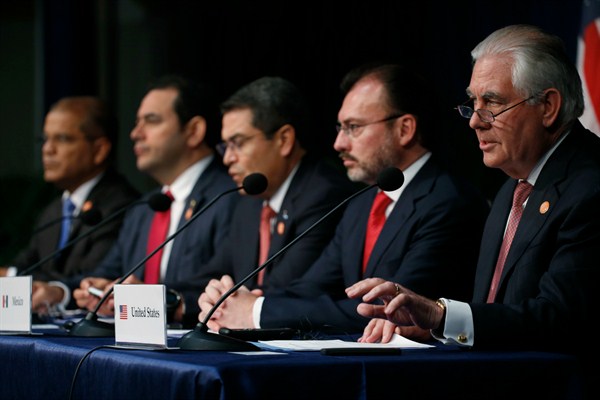Over two days in Miami earlier this month, the leaders of Honduras, Guatemala and El Salvador met with officials from the United States and Mexico to discuss the longstanding challenges of combating transnational crime, narcotrafficking and corruption in Central America. Any discussion of migration policy, however, was explicitly off the table at the Conference on Prosperity and Security, which included U.S. Vice President Mike Pence, Secretary of State Rex Tillerson and Homeland Security Secretary John Kelly. Despite brutal conditions in the region that have driven a spike in migration north in recent years, the Trump administration’s narrow priorities in Central America became clear in Miami, if they weren’t already.
Plagued by gang warfare, weak government institutions, abusive law enforcement, gender-based violence and a lack of economic opportunity, the countries of Central America’s Northern Triangle—Honduras, El Salvador and Guatemala—figure among the most dangerous in the world. In 2016, El Salvador recorded one of the highest murder rates in its history.
In 2014, over 70,000 unaccompanied minors from the Northern Triangle sought asylum at the U.S.-Mexico border over the course of just three months, which prompted renewed U.S. attention. Calling it a “humanitarian crisis,” former President Barack Obama responded by increasing immigrant detention facilities on the U.S.-Mexico border and proposing additional foreign aid to assist Honduras, El Salvador and Guatemala in addressing root causes of migration and insecurity. The Obama administration also increased U.S. assistance to Mexico to secure its own southern border to deter further emigration to the United States. This deterrence strategy resulted in a 70 percent increase in deportations from Mexico, as well as a spike in abuses committed against migrants in transit, according to Daniella Burgi-Palomino, a senior associate at the Latin American Working Group in Washington.

